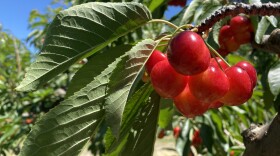-
Many USDA researchers working in the Northwest are fired, worked on everything from hops to potatoesFrancisco Gonzalez, 36, said he has a new house, furniture and a car to pay for. Plus, his wife and two young daughters.“Now we’re stuck with these…
-
Every October in the backyard of a Bothell home, a team of workers swarm around millions of blue orchard mason bees, to harvest the hibernating bees. The company, Rent Mason Bees, quickly takes apart and cleans the wooden nesting blocks that gardeners and farmers across the state use in the spring to house these tiny pollinators. The company offers this service as part of its mason bee rental program.
-
(Runtime 3:26)The French family expects a crowd for cherries this warm week.Richland’s Ray French Orchard has been a you-pick since 1988. They market…
-
(Runtime :58)Experts say they are not sure how the highly-pathogenic avian influenza is passed among dairy cattle yet, but birds and cattle mingle a lot…
-
(Runtime 1:04)At a recent “field day,” about 100 Northwest farmers and scientists from across Washington and Oregon scuffed through sand, walking between…
-
Correspondent Lauren Paterson tells us how a bit of elegant plant science is used to make cantaloupes a more viable crop. (Runtime :51)Growing cantaloupes…
-
By Brandon HollingsworthFor Washington's agricultural interests, February was marked by wet weather and temperature shifts.Farms in western Washington…
-
Easterday Ranches and Easterday Farms has provided beef, potatoes, onions and produce to dinner tables for more than three generations. Now in bankruptcy, many of the family’s key properties will be sold to repay debts. It’s one of the largest sales of prime water-rich agricultural lands in the Columbia Basin in recent history.
-
Much of the Northwest’s high country is still deep in good snowpack but short on rain this spring. That has dryland wheat farmers and cattle ranchers fretting. Cold, wind and dust are even wreaking havoc with produce farmers in the region.
-
Researchers in Washington have lost track of an Asian giant hornet they were following — a stinging setback in the pursuit to eradicate an invasive species that threatens to decimate North American bee populations.
Play Live Radio
Next Up:
0:00
0:00
Available On Air Stations










